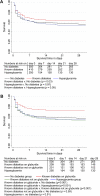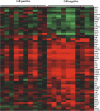Glyburide is anti-inflammatory and associated with reduced mortality in melioidosis
- PMID: 21293047
- PMCID: PMC3049341
- DOI: 10.1093/cid/ciq192
Glyburide is anti-inflammatory and associated with reduced mortality in melioidosis
Abstract
Background: Patients with diabetes mellitus are more prone to bacterial sepsis, but there are conflicting data on whether outcomes are worse in diabetics after presentation with sepsis. Glyburide is an oral hypoglycemic agent used to treat diabetes mellitus. This K(ATP)-channel blocker and broad-spectrum ATP-binding cassette (ABC) transporter inhibitor has broad-ranging effects on the immune system, including inhibition of inflammasome assembly and would be predicted to influence the host response to infection.
Methods: We studied a cohort of 1160 patients with gram-negative sepsis caused by a single pathogen (Burkholderia pseudomallei), 410 (35%) of whom were known to have diabetes. We subsequently studied prospectively diabetics with B. pseudomallei infection (n = 20) to compare the gene expression profile of peripheral whole blood leukocytes in patients who were taking glyburide against those not taking any sulfonylurea.
Results: Survival was greater in diabetics than in nondiabetics (38% vs 45%, respectively, P = .04), but the survival benefit was confined to the patient group taking glyburide (adjusted odds ratio .47, 95% confidence interval .28-.74, P = .005). We identified differential expression of 63 immune-related genes (P = .001) in patients taking glyburide, the sum effect of which we predict to be antiinflammatory in the glyburide group.
Conclusions: We present observational evidence for a glyburide-associated benefit during human melioidosis and correlate this with an anti-inflammatory effect of glyburide on the immune system.
Figures



References
-
- Wiersinga WJ, van der Poll T. Is the septic response good or bad? Curr Infect Dis Rep. 2007;9:366–73. - PubMed
-
- Suputtamongkol Y, Chaowagul W, Chetchotisakd P, et al. Risk factors for melioidosis and bacteremic melioidosis. Clin Infect Dis. 1999;29:408–13. - PubMed
-
- Victora CG, Huttly SR, Fuchs SC, Olint MTA. The role of conceptual frameworks in epidemiological analysis: a hierarchical approach. Int J Epidemiol. 1997;26:224–7. - PubMed

